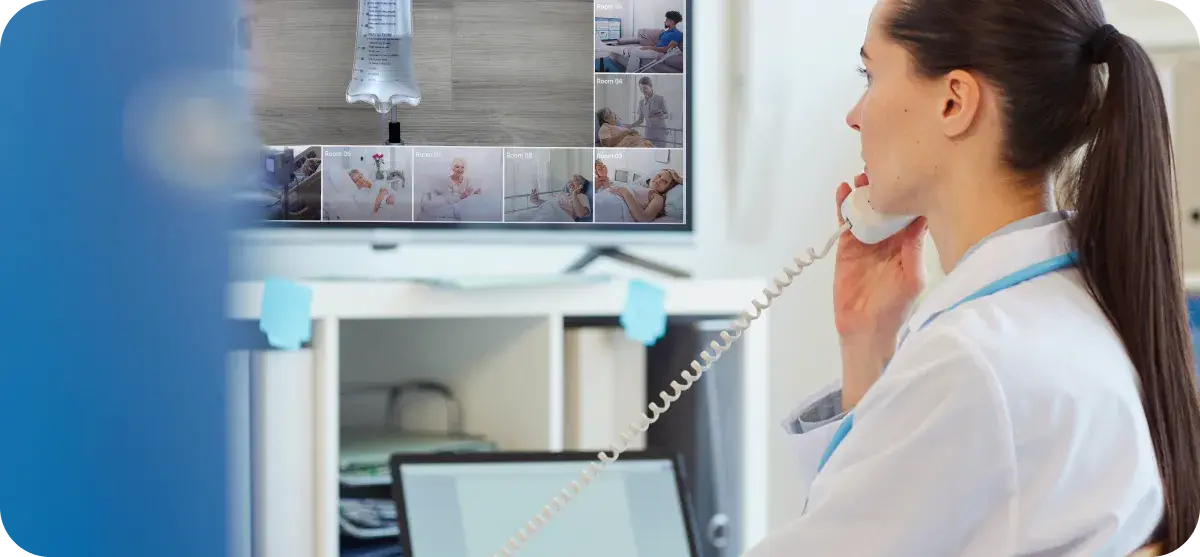Pioneering
The Role of Virtual Rounding in Process Improvement
Jul 31, 2023
The digitization of healthcare, a market valued at USD 233.5 billion in 2022, is projected to nearly quadruple to USD 981.5 billion by 2032 [1]. This massive growth is a testament to the potential of technology to revolutionize healthcare practices, from patient interactions to administrative processes. One of the game-changing innovations within this digital surge is virtual rounding. Its emergence and adoption indicate a shift from traditional patient-care methods, steering the future of healthcare towards a more efficient, patient-centered model.
hellocare stands at the forefront of this digital revolution, championing the benefits and efficiencies of virtual rounding. By integrating technology with patient care, hellocare offers healthcare providers the tools to monitor patients more effectively, ensuring that care is not only timely but also tailored to individual needs.
This pioneering approach has indicated sweeping changes in hospital processes and resource distribution. No longer are nurses tethered to a physical presence or encumbered by the logistical challenges of large healthcare facilities.

In traditional hospital settings, nurses were found to expend nearly a quarter of their shift—25% to be exact—just moving around within the hospital premises. By introducing virtual rounding, this significant time sink is virtually eliminated. Nurses can now channel this saved time into providing enriched, direct patient care, enhancing the quality of service and attention each patient receives.
Another revolutionary change brought about by virtual rounding is the shift in the nurse-to-patient ratio. Transitioning from a 1:5 to a more efficient 1:6 ratio, virtual rounding alleviates the pressure on nursing staff. This optimized workload distribution not only ensures patients receive adequate care but can also boost job satisfaction among healthcare providers. A balanced workload often translates to decreased burnout and increased retention rates among nursing professionals.
Virtual rounding is poised to redefine healthcare delivery. Its promise lies in a system that champions efficiency, prioritizes patient well-being, and consistently delivers top-tier care quality.
The staggering figures surrounding HAIs—a whopping 1.7 million infections leading to 99,000 deaths annually in the U.S alone [2]—underline the need for innovative interventions. Virtual rounding provides one such solution. By minimizing physical interactions, the risk of infection spread drops significantly, offering a safer environment for both patients and healthcare providers.
The adage that the patient is central to healthcare holds true, especially in the digital age. Virtual rounding tools, such as those provided by hellocare, enhance patient experience, leading to increased satisfaction levels. In fact, a recent survey showcases this positive shift, with 79% of patients expressing higher satisfaction when their care providers employed technology-driven healthcare methods [3].
The trajectory of healthcare's digital transformation is clear. As we move deeper into this era, solutions like virtual rounding, spearheaded by innovators like hellocare, are not just desirable—they're essential. Addressing key challenges faced by the healthcare industry, from staffing pressures to patient satisfaction, virtual rounding is poised to redefine healthcare delivery. Its promise lies in a system that champions efficiency, prioritizes patient well-being, and consistently delivers top-tier care quality.
Related posts

How Virtual Care Delivery Addresses Staff Shortages
The digitization of healthcare, a market that was USD 233.5 billion in 2022 and that's projected to reach USD 981.5 billion by 2032, has unlocked a wealth of opportunities for improving patient care and operational efficiency...

Virtual Care for Patient Admission and Discharge
As technology continues to shape the healthcare landscape, virtual care is emerging as an essential tool in managing patient admission and discharge processes. A 2021 report suggested that the telehealth market...